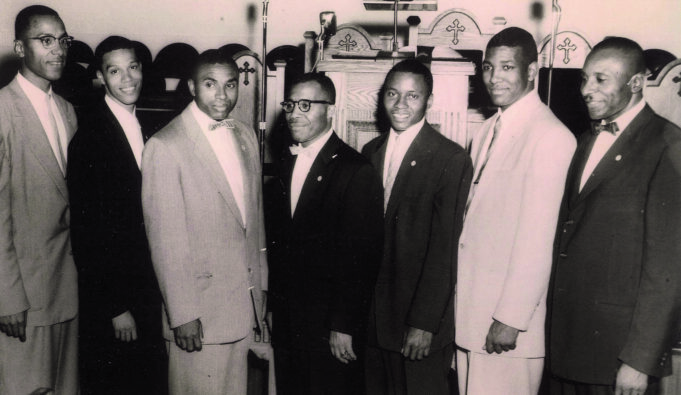The Honorable Minister Louis Farrakhan is known to the entire world as a great and bold defender of Black and oppressed people. Generations have marveled at his fearless speech and his loving and healing nature toward his people.
Today, the Minister presents on international stages, but there were those who have been with him since he mounted his first rostrum as a young member of the Nation of Islam in the 1950s. They reflect on the man he’s been and the man he’s become, following his 90th birth anniversary on May 11.
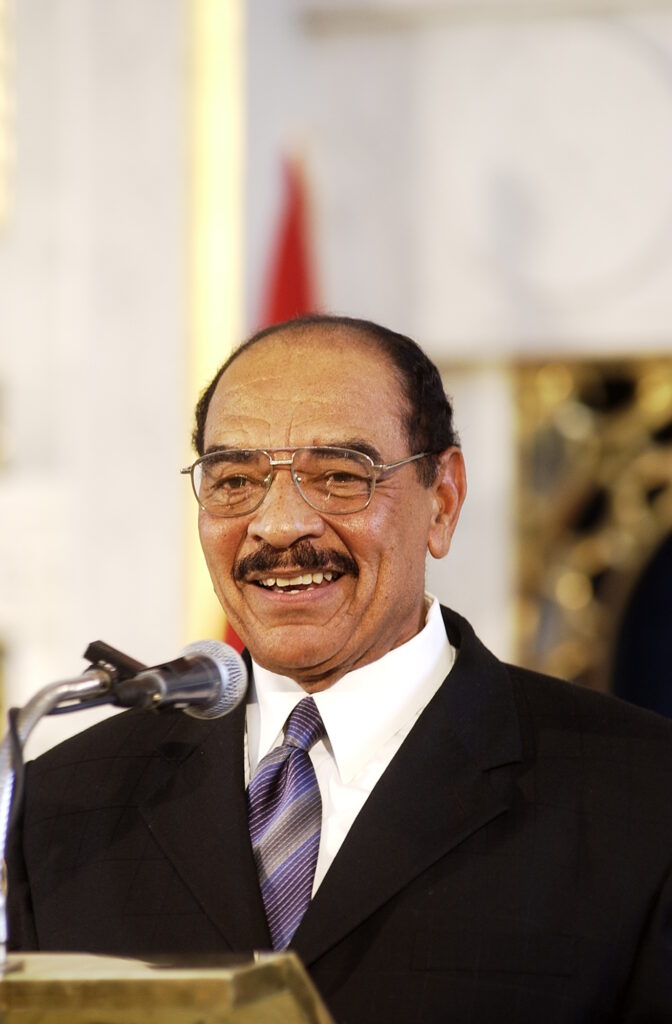
A different man with a different perspective
Louis Eugene Walcott joined the ranks of the Nation of Islam in 1955 and became Brother Louis X. Minister Thomas Jehad joined roughly two years before him in 1953. He first heard the Teachings of the Most Honorable Elijah Muhammad at the age of 17, while working on the docks in Brooklyn, N.Y. He was present at Min. Farrakhan’s very first F.O.I. Class (Fruit of Islam, the men of the Nation of Islam) when he made a serious vow.
“He stood before the men with tears coming out of his eyes saying he’d been looking for a man like the (Hon. Elijah Muhammad) all the days of his life,” Min. Jehad recalled. “He pledged to us that night that he would take this word to every nook and every cranny throughout the hells of North America.” Min. Jehad said at that moment, it occurred to him that Louis X was “a different kind of person, a different kind of brother.”
Both Min. Jehad and Min. Farrakhan became students in the ministry class at Temple No. 7 in New York. “We were all growing up on the rostrum and I was in the most need of help,” he said, laughing. “So, I got help from him.” Min. Jehad said he was a high school dropout, but Min. Farrakhan spoke as if he’d come out of Harvard, Yale or any Ivy League school. He said the Minister never acted as if he was better than anyone.
Min. Farrakhan eventually became the minister over Boston’s Temple No. 11 and Min. Jehad ministered in Hartford, Conn., and Springfield, Mass. On Sundays, he would travel the 26 miles to teach twice––once in Hartford and once in Springfield. But oftentimes, Min. Farrakhan would offer to travel the 70 miles from Boston to Springfield so that Min. Jehad didn’t have to teach twice on Sundays.
“He was always giving,” Min. Jehad said. Their friendship grew as they traveled to New York and Chicago together. “I mean, his notes were so great, and I have gained so much from him and I’ve been gaining from him for 68 years,” Min. Jehad said.
As they continued to work together, Min. Jehad said Min. Farrakhan’s treatment of people never changed.
“The way he treated people who other people might shun, I’ve never known him to be that way with anybody,” he said. “I have come to know that if you are his friend, that friendship will never break unless you break it. But that’s a friend for life and that’s the kind of man he’s always been. … A lot of people walk away from him. But he don’t walk away.”
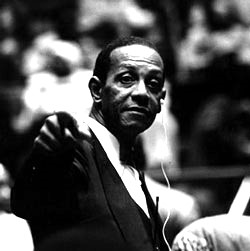
‘He took it to another level’
Min. Farrakhan was already the minister in Boston when Abdul Wahid Muhammad first met him in 1962. He was 26 years old.
Bro. Wahid began the processing class in San Francisco, Calif., under Minister Jabril Muhammad, known as Bernard Cushmeer at the time. He then traveled to St. Louis, Missouri, after learning that the Honorable Elijah Muhammad would be speaking there. Just a few days later, he traveled to Boston to visit his brother after hearing he had become a Muslim.
“When I first heard Min. Farrakhan speak … I felt that he was a little different than the other ministers that I heard,” Bro. Wahid shared. “He took it to another level, and my level of understanding was getting clearer because of Min. Farrakhan.”
Bro. Wahid stayed in Boston where Min. Farrakhan guided him through the processing class, teaching him lessons along the way. He recited to lieutenants there and got his ‘X’ before returning to San Francisco.
For Min. Abdul Bey, he first heard the Teachings in 1950 in Detroit. He met Min. Farrakhan soon after he joined the Nation, around 1955 or 1956. He recalls being in the luncheonette in New York when an important instruction came down from the Honorable Elijah Muhammad.
“The word spread around to those that were at the luncheonette and that was my first time hearing it,” Min. Bey said. “And I was surprised to hear something like that, either get out of show business or get out of the mosque. So, you had a choice to make.”
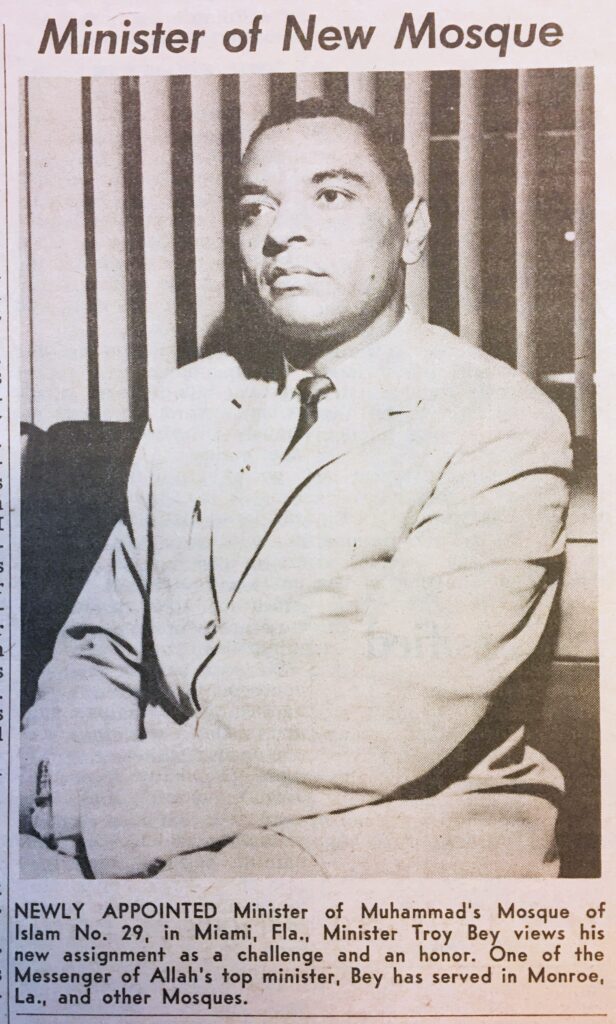
Min. Farrakhan was also there at the luncheonette and heard the news. Music was his first love, but he quickly made the decision that he would give it up and devote his life to the Teachings of the Honorable Elijah Muhammad.
Min. Bey was most impressed with how Min. Farrakhan handled the Teachings. “The Honorable Elijah Muhammad wanted us to study the English language and speak it more properly, and all the words we found hard to pronounce, we were trying to sharpen them up and make ourselves look much better,” Min. Bey said. “I was very impressed with the way he handled the English language. As far as I know, he was an educated brother at that time.”
He says Min. Farrakhan brought a different kind of perspective to the ministry.
“The perspective that he brought to the ministry before the Most Honorable Elijah Muhammad departed was the divinity of the Most Honorable Elijah Muhammad,” explained Min. Bey. “He referred to him as the Holy Apostle. So, he brought this view of the Most Honorable Elijah Muhammad with him. And so, we started calling him the Holy Apostle, but it was Farrakhan first because Farrakhan had another view of the Most Honorable Elijah Muhammad.”
Rebuilding the work
Bro. Wahid Muhammad remained in contact with Min. Farrakhan after returning to San Francisco. In fact, Min. Farrakhan called on him in 1977, two years after the Honorable Elijah Muhammad departed. His son, Imam W.D. Mohammed took over, but strayed from the way of his father. So that he would not cause division within the Nation, Min. Farrakhan quietly left and returned to California to try to get back to his music.
On a Friday in September 1977, Wahid Muhammad was there when Min. Jabril Muhammad came to see the Minister at a hotel in Los Angeles. He had a brown paper bag with literature inside that he gave Min. Farrakhan to read. On Sunday, Bro. Wahid returned to the hotel to see Min. Farrakhan, however, Min. Jabril was already there.
“When they opened the door, I knew something happened because they both had tears coming out of their eyes. His whole spirit was totally different. I said, he’s a totally different person now,” Bro. Wahid recalled.
It was then that Min. Farrakhan told Min. Jabril, “Your eye operation was successful. The scales have been removed from my eyes.” That’s when Min. Farrakhan decided to rebuild the work of the Honorable Elijah Muhammad. “He said, will you help me? I said, ‘yes sir,’” Bro. Wahid said. He told the Minister anything he does for the Honorable Eljah Muhammad, “I’ll help you.”
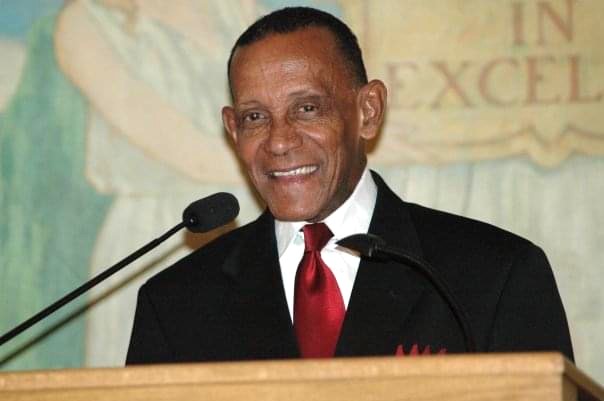
Bro. Wahid moved back to Chicago a few months after Min. Farrakhan did. They worked in the basement of Min. Farrakhan’s home. “We met in Min. Farrakhan’s basement in his home every day. Seven days a week, 365 days a year,” Bro. Wahid reflected. “There was no such thing as we were off on Saturday and Sunday. We were too far behind to take any time off, so we met every day.”
The growth of a man of God
Min. Jehad says he’s constantly feeding on Min. Farrakhan’s wisdom and example. “It’s been an honor to know him, and I don’t say I know him. I’m getting acquainted with him,” he said. “I’ve been acquainted with him for 68 years, and I really don’t know him yet. I saw Louis X turn into the Messiah.”
He said Min. Farrakhan’s mission compels people to help him. “He is driven to help Black people. He’s always (been) that way ever since I’ve known him. … When you get involved with him, you become compelled to help him. You feel it more than anybody else. You know you’re compelled to help him and that’s what he brings out in people,” he said.
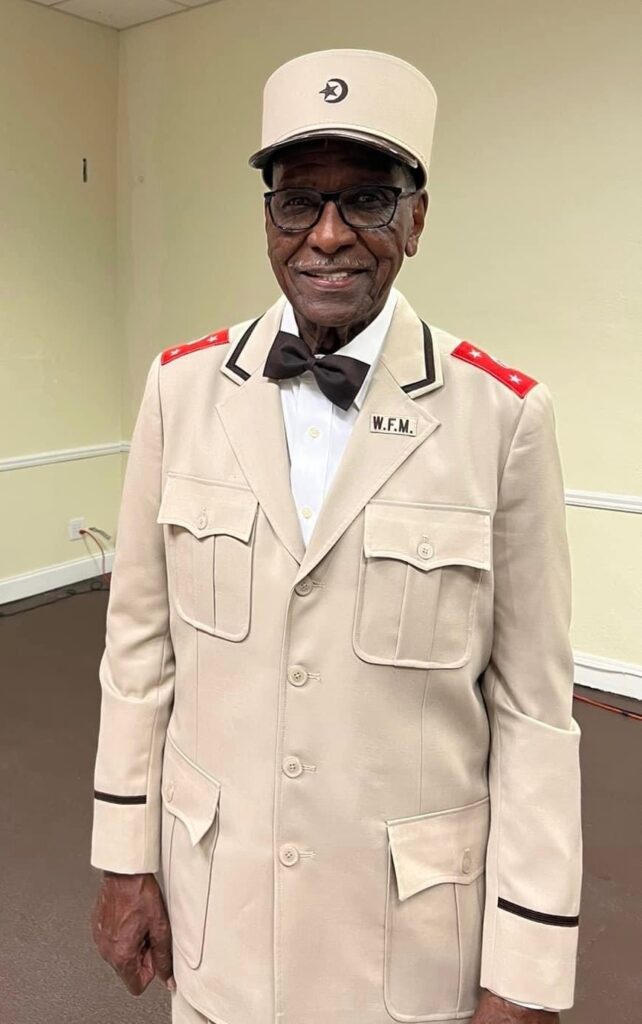
Min. Jehad said he could bear witness that Min. Farrakhan was a man of God from the day he met him. “The first day I heard him teach, I connected him and the Messenger together because I’d just heard the Messenger the day before that,” he said.
“Since that time, I could see Allah grow the Minister into (a) god. He kept going higher and higher and higher. … My testimony is, I started seeing the Minister as being a god from the first time I heard him speak. He was a little god.
As the Qur’an says, I will grow you into Me. Well, I’ve seen Allah grow the Minister into Himself. I can never thank Allah for blessing me to be a part of that man’s life and see Allah grow him into Himself. He grew him into Himself for the same reason he grew the Hon. Elijah Muhammad into Himself by obedience to Him.”
Min. Bey said words cannot describe the greatness of Min. Farrakhan. “Wow! I really don’t have the vocabulary to select those words for such a person,” he said. “I’ve noticed the growth of Farrakhan.
(His divinity), I guess it would take some time to see that. But after a while, with the accomplishments of Farrakhan and his travels and the things that he would say when you would hear him speak, you had to arrive at that decision, that this man is divine. Without a doubt.”
Min. Bey says he would often strive to be like Min. Farrakhan. “For me to be around him, I used to do all I could to try to practice so I could talk like him, and act like him or be like him,” he said. “He was a very, very impressive person. And you would want to be like him. All of the little boys coming up and new beginners in the Nation of Islam, you’d want them to copy after Farrakhan. He was an example. Not just then, but even now.”
—J.S. Adams, Contributing Writer












